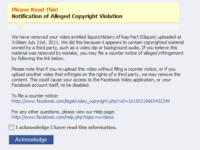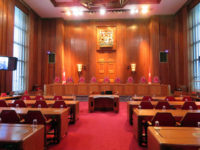The initial emphasis on last week’s Supreme Court of Canada’s copyright notice decision has focused on how Internet providers can pass along the specific costs associated with subscriber disclosures beyond those required for the notice-and-notice system to rights holders. The ruling rightly restores the notice system back to its intended approach, but it is not the only takeaway with implications for the recent flurry of file sharing lawsuits. While there has been a huge number of claims filed in Canada (with some surprisingly large settlements), the Supreme Court acknowledged important limitations in notice claims, noting that merely being associated with an IP address is not conclusive of guilt.

Telecom by yum9me (CC BY-NC-ND 2.0) https://flic.kr/p/53jSy4
Telecom
Supreme Court of Canada on Copyright Notices: Identification of IP Address “Not Conclusive of Guilt”
Notice the Difference?: Supreme Court Rules ISPs Can Be Compensated for Copyright Costs
Policy makers have long struggled to strike a fair balance in crafting rules to address allegations of copyright infringement on the Internet. Copyright owners want to stop infringement and the right to pursue damages, Internet subscribers want their privacy and freedom of expression rights preserved in the face of unproven allegations, and Internet providers want to maintain their neutrality by resolving the disputes expeditiously and inexpensively.
My Globe and Mail op-ed notes that the Canadian system for online infringement was formally established in 2012 and came into effect in 2015. The so-called “notice-and-notice” approach grants rights holders the ability to send notifications of alleged infringement to Internet providers, who are required by law to forward the notices to the relevant subscriber and to preserve the data in the event of future legal action. The system does not prevent rights holders from pursuing additional legal remedies, but Internet providers cannot reveal the identity of their subscribers without a court order.
“This Really Isn’t Our Fight and It Will Cost Us”: Behind the Scenes of CBC Support for Bell’s Website Blocking Plan
Bell’s behind-the-scenes effort to drum up support for its site blocking proposal at the CRTC has been the subject of several posts over the past few months. Based primarily access-to-information requests, I’ve identified Bell pressure on universities and colleges such as Ryerson University, George Brown College, and Brock University, who all submitted support letters to the CRTC, though those letters were not always quite what they seemed (Brock University quickly distanced itself from the submission, the Dean behind the Ryerson letter advised Bell that he could not speak for the faculty). Earlier posts also highlighted Bell’s astroturfing campaign with its own employees and its undisclosed meetings with CRTC officials months before the proposal was made public.
Telus vs. Telus: Who Do You Believe on Wireless Competition in Canada?
The state of Canadian wireless competition has been a much-discussed issue in recent years with numerous reports providing evidence that Canadians pay some of the highest rates in the world. In fact, even the Competition Bureau has concluded that “market power concerns persist in the Canadian wireless industry” and “when market power is exercised, prices are higher, and wireless penetration is lower, than in a market that is competitive.” In response to the Competition Bureau’s report, Telus argued that the CRTC should “reject the Bureau’s submission in its entirety.”
Behind Ryerson’s Support for Site Blocking: Bell Reviewed Draft Submission, Was Warned It Did Not Represent Faculty View
Having examined how Brock University and George Brown College (part one and part two) came to support the Bell coalition website blocking plan, this post relies on Ryerson documents obtained under access to information laws to reveal how Charles Falzon, Ryerson’s Dean of Communications and Design, came to write in support of the site blocking plan. Much like the other two institutions, Falzon was approached by Mark Milliere, a Bell executive, asking for Ryerson’s support for the initiative.











